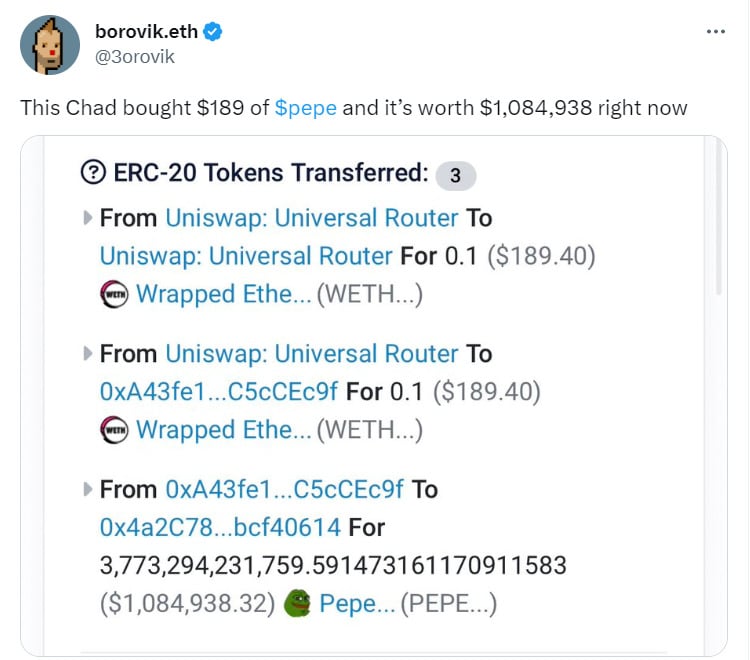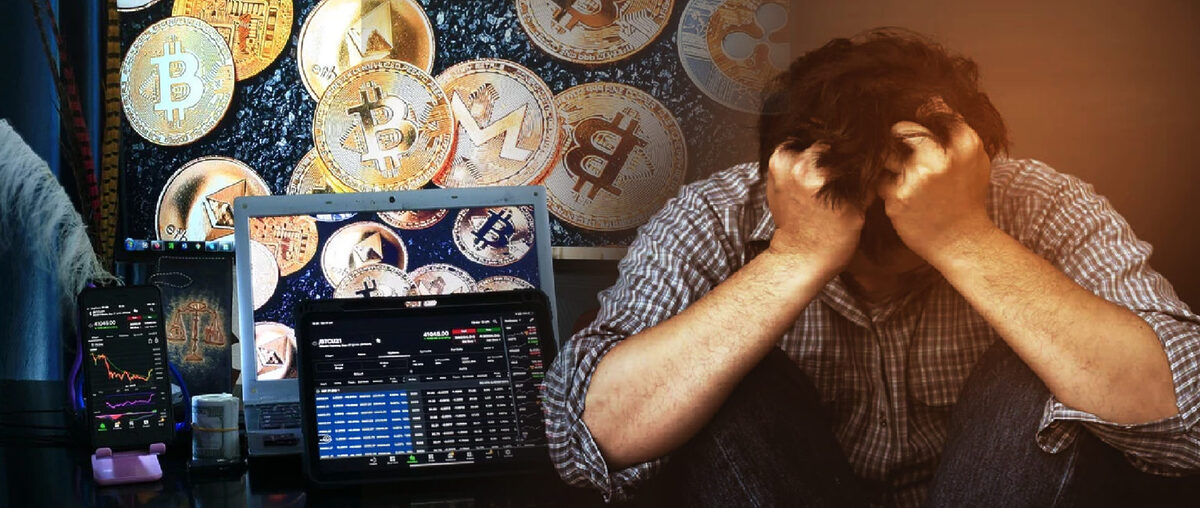
Crypto addiction is one of the most dangerous and elusive issues in the blockchain industry. If you obsessively check digital currency prices and scour crypto Twitter for new trades, it might be time to ask yourself if you have a cryptocurrency addiction.
The crypto market is an emotional rollercoaster. There’s no denying it, watching your portfolio explode in value gives off a euphoric high. On the other hand, watching Bitcoin (BTC) crash and seeing your wealth evaporate is devastating. Combine this with a 24/7 trading environment, and you have a high-risk environment for crypto traders.
According to addiction experts, cryptocurrency addiction is inherently similar to gambling addiction. It can cause a horde of health problems and put people under significant financial strain.
Sponsored
In this article, we’ll shed much-needed light on crypto’s elephant in the room. We’ll explore the disastrous effects and signs of crypto addiction and give helpful tips on how to master it.
What Is Cryptocurrency Addiction?
Put simply, cryptocurrency addiction is a pathological and obsessive compulsion to trade crypto. As the crypto market expands, related activities like NFT trading and DeFi yield farming should also be included under the crypto addition umbrella.
Sponsored
Even if you’re not day-trading Ethereum (ETH) and other altcoins around the clock, checking price charts and browsing social media for trending crypto content also qualify as addictive behavior.
Why Is Trading Crypto so Addictive?
The crypto market is exceptionally volatile, with massive and unexpected price swings helping thousands of people worldwide turn hundreds of dollars into millions. In some cases, meme coin traders make over one million USD in just two weeks.

Beyond the prospect of life-changing gains, these market swings have a profound effect on our brain’s chemistry. Winning trades release a tsunami of dopamine and other ‘feel-good’ hormones in the brain, encouraging you to enter more trades in the hunt for another chemical kick. In many ways, crypto addiction bears many similarities to substance abuse.
While losing trades prompts feelings of despair, they also trigger a sense of hunger similar to what gamblers feel at the casino. Traders tell themselves that the next trade might be the 100x gem they’ve been waiting for, this is also called ‘partial reinforcement.’
By reading charts and conducting deep research and analysis, crypto traders convince themselves that they have a competitive edge. Unlike games of chance, cryptocurrency trading gives the illusion of control.
Unlike traditional financial markets, crypto is open 24/7. The markets never close, so it’s harder for people with a crypto addiction to stick to consistent trading habits and reduce their exposure to the market.
The Negative Effects of Crypto Addiction
Like a gambling addiction or substance abuse, crypto addiction is linked to mental health issues and can put excess strain on your life outside of crypto. Many popular crypto Twitter accounts have spoken out about how their crypto addiction destroyed their professional motivation and caused tension in their personal relationships.

This is only the tip of the iceberg; sustained crypto addiction can lead to difficulties in a variety of areas of your life:
- Mental health issues – Addiction, both within and outside of crypto can lead to depression and anxiety. When compounded with financial stress and strained personal relationships, these health problems can quickly cascade into feelings of hopelessness and suicidal thoughts.
- Financial issues – A string of losses could lead a crypto addict to take out credit card loans to fund new trades. This contributes to cascading debt, thievery, and personal bankruptcy. Crypto addicts have said that their addiction stopped them from paying rent and other bills.
- Lack of motivation – In the human brain, the dopamine rush experienced from crypto trading is generally stronger than feelings of fulfillment achieved from work or school. Crypto addicts are known to neglect their professional and educational responsibilities in favor of chasing the ‘next big trade.’
- Strained personal relationships – Loved ones and family members also feel the effects of cryptocurrency addiction. Some crypto addicts have reported breaking up with their partners over their addiction, or stealing money from friends and family to fund new trades and investments.
- Gateway to substance abuse – The feelings of shame and hopelessness common amongst people suffering from addiction might lead them to seek refuge in harmful substances.
Signs of Crypto Addiction
We can all agree, cryptocurrency addiction is certainly something that anyone involved in the blockchain industry wants to avoid at all costs. What are the first signs of addiction and how can we recognize them?
- Inability to stop – It sounds obvious, but being unable to stop trading for a few days is an indicator that you’re addicted to trading.
- Obsessive price checks – Checking crypto prices every few minutes is one of the most common signs of addiction in cryptocurrency. While it might seem harmless if you don’t have any open trades, obsessively checking prices means that your brain never truly switches off from the crypto market.
- Disinterested in non-crypto activities – People often report that since having a crypto addiction, they no longer find enjoyment in their other hobbies, like spending time with friends or playing sports or music.
- Lying about or hiding your trades – Lying about trades or trying to hide them from loved ones is a sign that someone with a crypto addiction knows they’re not behaving rationally.
- Making unsound financial decisions – Using money that is usually reserved for living expenses, like paying rent or bills, to open new trades is a clear indicator that someone is addicted to crypto trading.
How to Fight Crypto Trading Addiction
Crypto addiction is an easy trap to fall into and there is no shame in acknowledging it. If you’ve recognized the symptoms mentioned above in yourself or someone you know, know that there are plenty of ways to fight crypto addiction.

The best thing you can do to combat a trading addiction is to find professional help. Addiction rehab centers are the safest and most supportive environments for recovering crypto addicts seeking help. You’ll have access to the best addiction treatment and addiction counselors available, giving you the best chance of recovery.
If you don’t have access to professional help, there are still many effective strategies available to you. Setting clear, non-negotiable boundaries with yourself around your trading habits is an excellent first step.
Set yourself a clear trading schedule and block yourself from trading or checking crypto prices outside these times. Additionally, be sure to only invest money you can afford to lose and never trade with money that isn’t yours.
Limit your exposure by deleting crypto-related apps from your phone and block websites and social media platforms where you might find crypto content.
Find alternative, healthy sources of dopamine release. These include regular exercise, socializing with loved ones and family, meditation, and reading.
It’s also important to recognize that for some people, fully exiting the crypto market and stopping trading entirely will be the best thing they can do for their own well-being.
On the Flipside
- When it comes to crypto addiction and mental health, there is no flip side. Taking care of yourself and your well-being is worth more than any amount of winning trades.
Why You Should Care
Thousands of people in the crypto market suffer from an addiction to trading, but no one ever wants to publically talk about it. Being able to recognize signs of addiction in crypto friends, and in ourselves, is an essential part of staying safe and healthy in the space.
If you recognize yourself or someone you know at any point in this article, please don’t hesitate to put into action any of the strategies mentioned above or seek professional help. Groups like Gamblers Anonymous and SMART Recovery are good places to find support and education about how to treat crypto and gambling addiction.
FAQs
Winning crypto trades releases dopamine in the brain. It essentially makes traders feel good, pushing them to open more trades trying to chase those feelings of success and fulfillment.
The best way to stop being addicted to crypto is to reduce your exposure and seek professional help. Setting clear rules around your trading habits and deleting crypto-related apps from your devices can help to limit your exposure.
Yes, in many ways, crypto is like gambling. The outcome of any speculative trade is always uncertain, and traders stand to either win or lose money based on results outside of their control.
In some cases, trading crypto can be bad for your mental health. Market movements can lead to feelings of stress and anxiety which are known to exacerbate other mental health issues.
